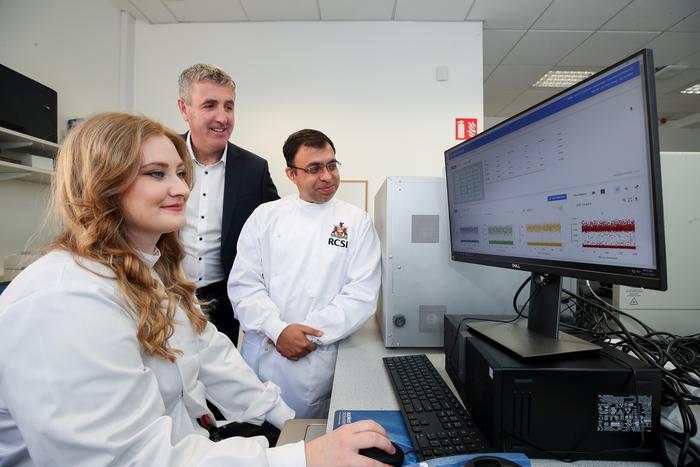RCSI-Serosep partnership aims to predict progression of ulcerative colitis

Credit: MAXWELLS
RCSI-Serosep partnership aims to predict progression of ulcerative colitis
Tuesday, 23 January 2024: A new partnership between RCSI University of Medicine and Health Sciences and Irish diagnostics company Serosep Ltd is set to personalise treatment for ulcerative colitis and ultimately improve quality of life for patients with the condition.
Under the new alliance, RCSI researchers will work with Serosep to accelerate the development of new tests to help predict disease progression in ulcerative colitis, a form of inflammatory bowel disease that damages the lining of the gut over time. The condition causes inflammation and ulcers in the large intestine (colon) and rectum.
The project will develop technology to identify ulcerative colitis patients who are likely to progress in their disease, ensuring that people get the most effective care for their disease, and sparing people treatments where they are not likely to be of benefit to them.
The partnership between Serosep and RCSI is co-funded by Serosep and the Enterprise Ireland Innovation Partnership Programme.
At present, medications known as 5-Aminosalicylates (5-ASA) are the most common first line of treatment for mild-to-moderate ulcerative colitis, and as the disease progresses, it is typically managed with steroids, immunosuppressants and biological drugs.
There is a pressing need to develop accurate biomarker-based methods to identify the best treatment regimes for patients soon after diagnosis.
“Currently there are no biomarkers which allow prediction of disease progression in patients with ulcerative colitis,” explained Dr Sudipto Das, Lecturer and Principal Investigator at RCSI School of Pharmacy and Biomolecular Sciences.
“Having such biomarkers could augment decision-making for clinicians about whether the patient could benefit from an escalation of treatment at an early stage of the disease.”
Dr Das’s team will work with Serosep to validate specific ulcerative colitis biomarkers that the RCSI group has identified in the lab. The plan is to create a new in vitro diagnostic solution that can support clinicians as they make decisions about the most suitable treatment for the patient based on a panel of biomarkers that can be measured and tracked in samples of their tissue and potentially in the blood as well.
“Through recent work in our lab we have identified specific genes that can potentially predict disease progression in adult ulcerative colitis patients,” said Dr Das.
“This partnership will allow us to further validate these genes in a larger cohort of patient samples and enable development of a test that can be applied in the clinic to identify patients who are likely to progress at an early stage of disease. This in turn would allow early treatment for those patients, and sparing patients who are less likely to progress from unnecessary treatment. The ultimate impact of this test would be to improve quality of life in patients with ulcerative colitis.”
Serosep Ltd founded in 1997 is headquartered in Limerick with subsidiaries in London and Johannesburg is focussed on the clinical in vitro diagnostic market specifically in infectious disease which has seen the company build an infrastructure to support its products from conception to commercialisation. Serosep was awarded Irish Medtech company of the year in 2022.
The company is excited to partner with RCSI on the project, according to Serosep CEO Dermot Scanlon. “It will allow us to create knowledge within the company through collaborative research, the outputs of which would present us with the opportunity for strategic diversification in our product offering to support our continued growth.”
Serosep CTO David Clancy outlined: “The collaboration with RCSI presents an opportunity for Serosep that will enable us to build expertise in new technologies to further develop our product portfolio and access new markets.”
Professor Fergal O’Brien, RCSI Deputy Vice Chancellor for Research and Innovation welcomes the partnership, noting how the goal of personalising treatment will benefit patients.
“This partnership will help to move scientific discovery into improved clinical practice, with a tool to help clinicians assess whether it is appropriate to escalate treatment in Ulcerative Colitis patients,” said Professor O’Brien. “As a health sciences university, we are solely focused on research to drive improvements in human health. Harnessing the expertise of both RCSI and Serosep, this collaboration will ultimately see patients get the treatment that will benefit them while other patients will be spared from side-effects of treatment options that would have been less effective, thus promoting personalised medicine in patients with ulcerative colitis.”
The partnership between Serosep and RCSI is supported by the RCSI Innovation team.
ENDS
About Serosep
Serosep, an indigenous wholly owned Irish biotech company founded in 1997 has grown to 121 people across its R&D, manufacturing and support facility in Limerick and its subsidiaries based in London & Johannesburg. Serosep exports worldwide and has taken its products through FDA, CE-IVDR and MHRA regulatory approval to access its target clinical markets.
About RCSI University of Medicine and Health Sciences
RCSI University of Medicine and Health Sciences is ranked first in the world for its contribution to UN Sustainable Development Goal 3, Good Health and Well-being, in the Times Higher Education (THE) University Impact Rankings 2023.
Exclusively focused on education and research to drive improvements in human health worldwide, RCSI is an international not-for-profit university, headquartered in Dublin. It is among the top 250 universities worldwide in the World University Rankings (2023). RCSI has been awarded Athena Swan Bronze accreditation for positive gender practice in higher education.
Founded in 1784 as the Royal College of Surgeons in Ireland (RCSI) with national responsibility for training surgeons in Ireland, today RCSI is an innovative, world-leading international health sciences university and research institution offering education and training at undergraduate, postgraduate and professional level.
Visit the RCSI MyHealth Expert Directory to find the details of our experts across a range of healthcare issues and concerns. Recognising their responsibility to share their knowledge and discoveries to empower people with information that leads them to better health, these clinicians and researchers are willing to engage with the media in their area of expertise.



